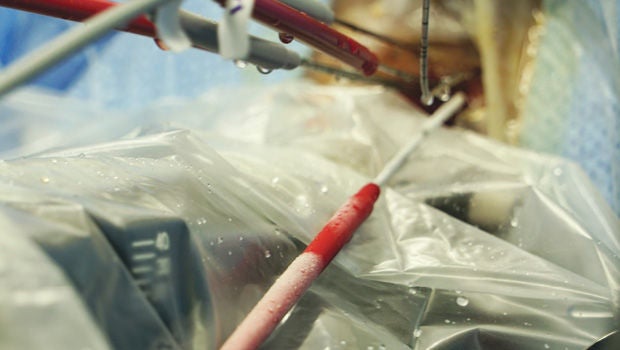
Argon gas is pumped through the cryoprobe to freeze the cancer cells at -40°C.
Cryotherapy treatment attacks only cancer cells in the prostate while leaving the rest of the organ intact.

Dr Tay Kae Jack is leading a study to identify the effectiveness of focal cryotherapy on prostate cancer. Photo: Vernon Wong
When prostate cancer is diagnosed, treatment usually involves either radiotherapy or surgical removal of the organ. While effective, these standard treatments can also bring on problems — some long-lasting or even permanent — such as incontinence, impotence, and injury to the rectum and bladder.
To avoid these damaging side effects, a team of Singapore General Hospital (SGH) urologists is studying the use of a treatment known as focal cryotherapy, which essentially targets and freezes the tumour in the prostate at very low temperatures to kill the cancerous cells. The healthy cells around the tumour are then not affected.
“Prostate cancer patients often find themselves in a dilemma after being told of the possible complications that may arise after treatment. This is why we want to explore a middleground treatment that is not so damaging, yet will treat prostate cancer effectively,” said Dr Tay Kae Jack, Consultant, Department of Urology, SGH.
“The treatment should not affect patients’ quality of life,” added Dr Tay, who is leading the study.
Aided by imaging
Between March 2019 and early January 2020, SGH recruited 18 out of a targeted 30 patients with localised prostate cancer to participate in its trial. Their tumours had to be aggressive and less than 1.8cm in diameter. After undergoing the procedure, these patients need to return to the SGH Urology Centre every quarter to complete a quality of life assessment and prostate-specific antigen (PSA) blood test, followed by a magnetic resonance imaging (MRI) scan and biopsy a year after.
So far, some patients have reported temporary pain and bruising, but no serious complications.
In focal cryotherapy, the aggressiveness, stage, and location of the cancer need to be accurately determined. This is possible with the Mona Lisa, a robotic biopsy system that combines MRI and ultrasound scan, which was developed by SGH’s Urology Department and engineers from Nanyang Technological University (NTU).
In the procedure, three to four 15cm needle-like cryoprobes are inserted through the perineum (the area between the anus and scrotum) into the tumour under ultrasound guidance. Argon gas is then pumped through the cryoprobes to freeze the cancer cells at -40°C. The procedure is performed as a day surgery in an operating theatre and takes about 45 minutes to complete.
New treatment option
Focal cryotherapy has been used to treat cancers of the bone, kidney, cervix, liver, and lung. However, it has not been used to treat prostate cancer in Singapore. It is estimated that 30 to 40 per cent of all prostate cancer patients could benefit from focal cryotherapy. If the results of the study are positive, the hospital could offer it as a treatment option.
Prostate cancer is the third most common cancer among men and the seventh most frequent cause of cancer death in Singapore. In many cases, prostate cancer is slow-growing and may take years to grow to a size large enough to become detectable.
Some prostate cancers, though, can be aggressive, growing quickly out of the prostate and spreading to other parts of the body. However, because of greater public education and awareness, the disease is increasingly being detected at the early stages, when it is usually treatable.
Between 2010 and 2014, prostate cancer occurred in 28.6 out of 100,000 men, but the death rate was 5.6 out of 100,000 men.













 Get it on Google Play
Get it on Google Play